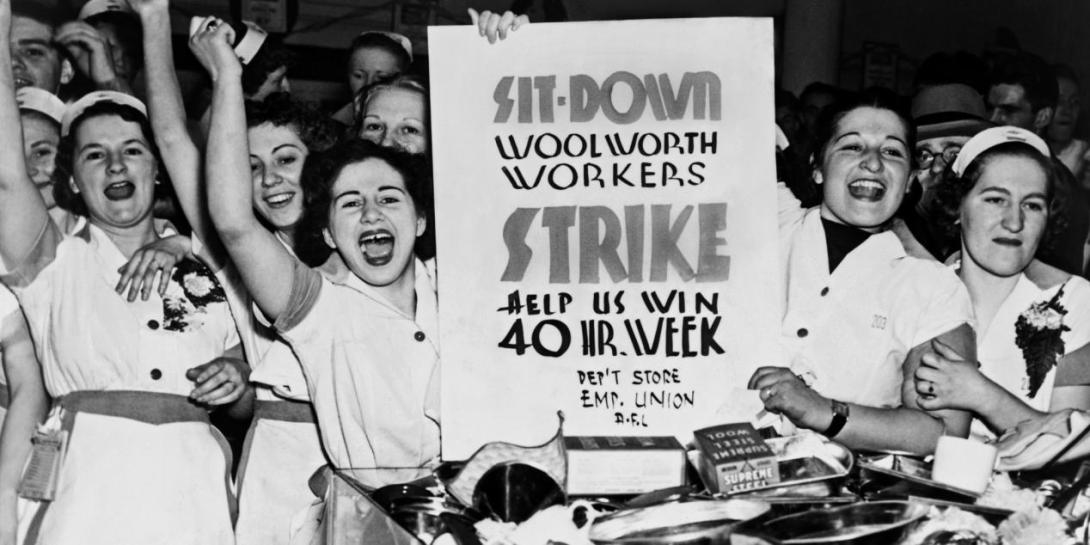
This article is part of the People’s World 100th Anniversary Series
It was the Walmart of its day, perhaps even the McDonald’s of its day as well. The Woolworth’s five-and-dime store empire stretched from coast to coast and even spread to countries beyond U.S. borders. It offered an array of low-priced merchandise and inexpensive meals (for white customers) at its segregated lunch counters. For almost 120 years, it was one of the dominant names in American retail, with a workforce numbering in the tens of thousands.
And like the low-wage big-box retail employers of today, it proved very resistant to attempts by its workers to organize into unions. Company founder Frank Woolworth had set up the chain with a philosophy: “We must have cheap help or we cannot sell cheap goods.” And nearly the entire non-management “cheap help” were women, mostly young women.
But in Detroit, in February 1937, the women at two Woolworth’s stores got together and initiated a sit-down strike, occupying their workplaces and refusing to leave. The tactic had recently been put to such effective use by Flint autoworkers.
The demands of the Detroit Woolworth’s workers: A ten-cent raise to their 28-cent hourly wage, time-and-a-half for overtime, seniority rights, and a reduction of the workweek from 52 to 48 hours. Some ambitious strikers wanted to go further, and slash their hours of drudgery to only 40.
The women’s strike electrified other low-wage workers and quickly began to spread. Cafeteria workers at another company in Detroit barricaded themselves inside their workplace; Woolworth’s workers in other cities began discussing the strike.
The workers’ chief adversary: the “Woolworth’s Princess,” heiress Barbara Woolworth Hutton. Within days, she ordered her managers to negotiate with the sit-down strikers and avoid a bigger disruption to business. The workers won a major victory, scoring a 5-cent increase and most of their other demands. The agreement covered all 40 Woolworth’s stores in the city.
In the article below, Daily Worker reporter Louise Mitchell visited a New York Woolworth’s store while the Detroit stores were still shut down. She interviewed the women there to get their thoughts on the strike and found that they were eagerly awaiting news from Detroit and hoped to join in the fight themselves.
While young women were the key actors in the Detroit Sit-Down Strike, they faced sexism from all sides. On the job, their managers were almost always men. Within their own union, it was male union officers who did all the negotiating with the company. Press coverage reflected the bourgeois norms of the day, minimizing the strike and its importance. In some ways, even the Daily Worker was not immune from giving the strike insufficient attention or the seriousness it deserved.
You Bet the Five-and-Dime Girls Are Watching Sisters in Detroit
By Louise Mitchell
Daily Worker, March 4, 1937
You know the old ditty, “I Met a Million Dollar Baby in a 5 and 10 Cent Store?”
Well, that’s how the girls in Woolworth’s feel these days. They’re sitting on top of the world, watching their sisters in Detroit sitting down on the boss.
It never happened before in this biggest chain of retail stores in the world. Young girls, blonde, brunette, slim, plump, going on strike for their rights.
Practically everybody knows the slave conditions these kids labor under. Long hours, short wages, tyrannical conditions. That’s their lot because they’ve never been organized.
The boys in auto taught them a thing or two. They’ve stepped out in the paths of the CIO—for decent conditions and they don’t give a damn who knows it.
Hot Stuff
I stopped around to find out how the girls behind the counter here in New York feel about it. I had to talk quiet and talk fast because I knew the floorwalkers must be jittery these days.
She asked me what kind of face cream I wanted, and I answered, “What do you think about Detroit?”
Quick as a flash, she laughed, “Hot stuff. Those girls got their nerve with them for doing it first. I was reading about it all in the papers, and they’re having a swell time, too.” She was all smiles. “I’ll bet they even make less than we do and for more hours. If they want ten cents an hour raise, you can think what they make now.”
At the wash cloth counter, the slight, undernourished countergirl in a crisp white collar said, “Everyone is talking about it. I mean, besides the girls in the store. Everyone who comes in. They’re anxious. There’s something going on alright. If you want something, you just take a squat and they come to terms. We oughta have a new popular song, “I’m sitting down for good until we’re on better terms.” She grinned as she threw somebody’s dime into the cash register.
Stand-up for Barbara

They’re all home-loving girls, and so it was quite easy. They’re more at ease eating and sleeping on the counter and in the aisles than on their feet endless hours of the day. And they won’t be home until Princess Barbara’s managers come to terms at the rate of a ten-cent increase over the twenty-eight cents they make now. They want time-and-a-half for overtime, seniority rights, and a 48-hour week instead of the 52-hour week they put in now. They’re giving darling Barbara her first real stand-up.
And the idea is catching on. Another ten-cent store has joined them. Arthur Offenback, New York labor organizer, declared: “We will close every Woolworth store in the land unless the employees get a square deal.”
Tired Dogs
Over the sandwich counter in a New York five-and-ten, a fair platinum-haired girl said, “I’d like to sit right down now, and do I wish I was there. If we ever did it in New York, would they have a job on their hands. Just think of all the stores they have here. And they’ve have a job to combat it.”
Another girl answered that she doesn’t think about those things, and besides, she was still standing up. The girl at the same counter looked up and laughed and said, “And are her dogs tired. She just told me so. This is the time in the afternoon when the minutes stretch like a piece of gum.
“I saw some of the pictures of the girls who are sitting and are they pretty. I guess they’re taking that long-needed rest.
“Wait till this thing comes to New York. Of course it’ll come. We’re all watching them and not saying much,” said the girl at the stationery counter.
Every one of them know about the happenings in Detroit. Some have heard talk. Some had read. But they all knew of it. And one girl said: “Just wait till this thing breaks in New York, we’ll even show Detroit how to sit down.”
We hope you appreciated this article. At People’s World, we believe news and information should be free and accessible to all, but we need your help. Our journalism is free of corporate influence and paywalls because we are totally reader-supported. Only you, our readers and supporters, make this possible. If you enjoy reading People’s World and the stories we bring you, please support our work by donating or becoming a monthly sustainer today. Thank you!












Comments